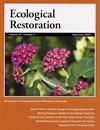记录澳大利亚湿热带地区景观规划、监测、研究和教育的恢复工作
IF 1.1
4区 环境科学与生态学
Q2 ECOLOGY
引用次数: 0
摘要
自然植被的恢复受多种因素的影响。恢复工作的成功日益与恢复计划、准备、实施和维护方面的知识共享联系在一起。这一趋势反映在区域和国际数据库的出现上,这些数据库整理和储存有关恢复项目的资料,并允许从业人员提取这些资料。在这里,我们描述了与恢复利益相关者和教育机构的研讨会如何确定方法来整理澳大利亚远北昆士兰大型热带雨林恢复项目的特定空间和非空间数据。我们展示了如何将这些数据存储在区域知识共享恢复平台中,以促进未来恢复项目的规划和改进实施,并确定特定地点的恢复抑制和促进因素。我们提供了一些例子,说明该数据库如何促进保护和恢复工作中的区域伙伴关系,以及如何使从业者和研究人员能够轻松地访问它。我们将演示如何通过将该数据库整合到高等教育机构的课程中,并通过其与现有全球数据库的潜在联系来确保该数据库的寿命。本文章由计算机程序翻译,如有差异,请以英文原文为准。
Documenting Restoration Efforts for Landscape Planning, Monitoring, Research, and Education in the Wet Tropics of Australia
ABSTRACT Restoration of natural vegetation is affected by many factors. Success in restoration is increasingly linked with knowledge sharing on restoration planning, preparation, implementation, and maintenance. This trend is reflected in the emergence of regional and international databases that collate and store information on restoration projects and allow the extraction of this information by practitioners. Here we describe how workshops with restoration stakeholders and educational institutions identified ways to collate project-specific spatial and non-spatial data on large-scale tropical rainforest restoration projects in Far North Queensland, Australia. We show how this data is stored in a regional knowledge sharing restoration platform that facilitates the planning and improved implementation of future restoration projects, and the identification of site-specific restoration inhibiting and facilitating factors. We provide examples on how the database promotes regional partnerships in conservation and restoration efforts, and how it can be made easily accessible to practitioners and researchers. We demonstrate how the longevity of this database can be ensured by its integration into a curriculum of a tertiary educational institution and by its potential linkage with existing global databases.
求助全文
通过发布文献求助,成功后即可免费获取论文全文。
去求助
来源期刊

Ecological Restoration
Environmental Science-Nature and Landscape Conservation
CiteScore
1.70
自引率
12.50%
发文量
24
期刊介绍:
Ecological Restoration is a forum for people advancing the science and practice of restoration ecology. It features the technical and biological aspects of restoring landscapes, as well as collaborations between restorationists and the design professions, land-use policy, the role of education, and more. This quarterly publication includes peer-reviewed science articles, perspectives and notes, book reviews, abstracts of restoration ecology progress published elsewhere, and announcements of scientific and professional meetings.
 求助内容:
求助内容: 应助结果提醒方式:
应助结果提醒方式:


